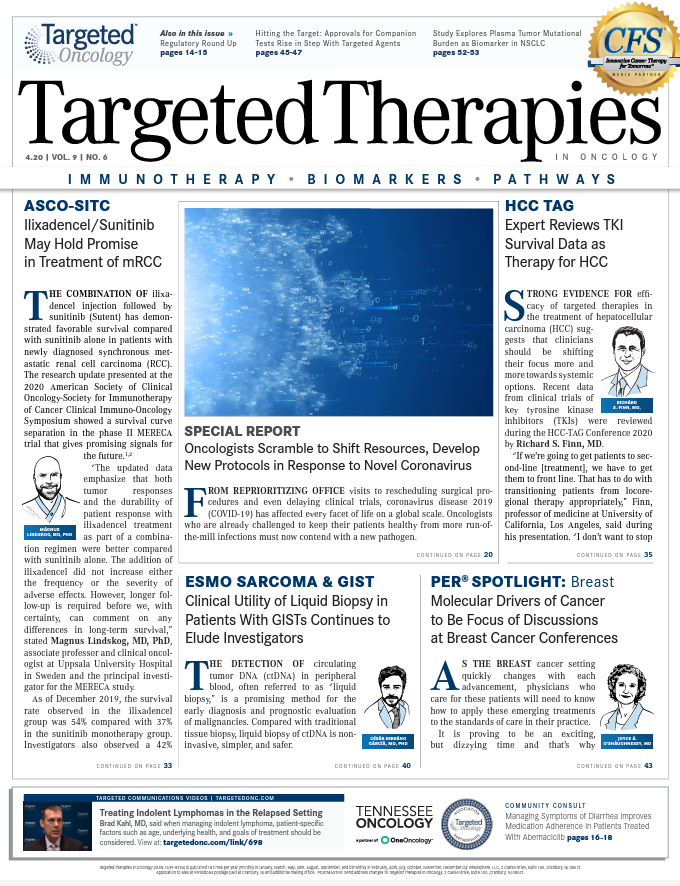Expert Reviews TKI Survival Data as Therapy for HCC
“If we’re going to get patients to second-line treatment, we have to get them to front line. That has to do with transitioning patients from locoregional therapy appropriately."
Richard S. Finn, MD

Strong evidence for efficacy of targeted therapies in the treatment of hepatocellular carcinoma (HCC) suggests that clinicians should be shifting their focus more and more towards systemicoptions. Recent data from clinical trials of key tyrosine kinase inhibitors (TKIs) were reviewed during the HCC-TAG Conference 2020 by Richard S. Finn, MD.
“If we’re going to get patients to second-line [treatment], we have to get them to front line. That has to do with transitioning patients from locoregional therapy appropriately,” Finn, professor of medicine at University of California, Los Angeles, said during his presentation. “I don’t want to stop locoregional therapy—it’s very important in managing a majority of patients we see. But it doesn’t cure them, and to keep doing it after progression will limit our ability to maximize what we can do.”
After the approval of sorafenib (Nexavar) in 2007, it took roughly a decade for investigators to reach positive end points for phase III trials assessing agents to treat advanced HCC. The most notable trials with positive data that Finn reviewed include REFLECT, RESORCE, CELESTIAL, and REACH-2.1-4
Lenvatinib in the Front Line
The FDA approved the oral multikinase inhibitor lenvatinib (Lenvima) in August 2018 as a frontline treatment for patients with unresectable HCC based on data from the phase III REFLECT trial. In the international, multicenter, randomized, open-label, noninferiority study, lenvatinib was found to be noninferior to the established first-line standard of care, sorafenib. Patients with unresectable HCC were randomized to lenvatinib (n = 478) or sorafenib (n = 476). The primary end point was overall survival (OS) noninferiority.
Results showed that the median OS by investigator review with lenvatinib was 13.6 months compared with 12.3 months for sorafenib (HR, 0.92; 95% CI, 0.79-1.06).1 The median OS for patients who responded to lenvatinib was 22.4 months compared with 11.4 months for nonresponders (HR, 0.61; 95% CI, 0.49-0.70; P <.001).1
As assessed by investigator review using mRECIST criteria, the objective response rate (ORR) was 24.1% with lenvatinib versus 9.2% with sorafenib (odds ratio [OR], 3.13; 95% CI, 2.15-4.56; P <.0001). By independent review, the ORR benefit with lenvatinib was even stronger (40.6% vs 12.4%; OR, 5.01; 95% CI, 3.59-7.01; P <.001). As assessed by independent review using RECIST 1.1 criteria, the ORR with lenvatinib was 18.8% (OR, 3.34; 95% CI, 2.17-5.14).
The noninferiority results were also consistent across patient subgroups in REFLECT, including age, gender, body weight, ECOG performance status, and posttreatment anticancer therapy. Moreover, lenvatinib significantly improved progression-free survival (PFS), time to progression, and ORR in this patient population.
“For the first time with a TKI, we’re starting to see significant response rates,” Finn said. “By mRECIST, the ORR by investigator review is 24%. By experts in the field, it was 41%, but even by RECIST, it was 19%. That’s a real response rate when compared with sorafenib, which historically had single-agent responses of 6.5%.”
Second-Line Settings
In the RESORCE trial, patients with radiologic progression during sorafenib treatment who had Child-Pugh A status and Barcelona Clinic Liver Cancer (BCLC) stage B or C disease not amenable to resection or locoregional therapy were randomized to receive regorafenib (Stivarga; n = 379) or placebo (n = 194) until disease progression, death, or unacceptable toxicity. In the primary analysis, the median OS with regorafenib was 10.6 months (95% CI, 9.1-12.1) versus 7.8 months (95% CI, 6.3-8.8) with placebo (HR, 0.62; 95% CI, 0.50-0.78; 2-sided P <.001).2
The multikinase inhibitor cabozantinib (Cabometyx) was evaluated for the treatment of HCC in the CELESTIAL trial. Here, 707 patients with previously treatedadvanced HCC were randomized to 60 mg of once-daily cabozantinib (n = 470) or placebo (n = 237). All patients had an ECOGperformance status of 0 or 1 and a Child-Pugh score of A and had progressed on≥1 prior systemic therapy for advanced HCC; 70% had received only prior sorafenib.3
Results showed that the median OS favored the cabozantinib arm over placebo at10.2 months versus 8.0 months, respectively (HR, 0.76; 95% CI, 0.63-0.92; P = .0049). By investigator assessment, the median PFS was 5.2 months for cabozantinib compared with 1.9 months with placebo (HR, 0.44;95% CI, 0.36-0.52; P <.0001). The ORR was4% with cabozantinib compared with 0.4% with placebo (P = .0086).3
Ramucirumab (Cyramza), a fully humanized monoclonal VEGFR2 inhibitor, was granted FDA approval in May 2019 for the treatment of patients with HCC who have an αfetoprotein (AFP) of ≥400 ng/mL and have been previously treated with sorafenib. The decision was based on results from the phase III REACH-2 trial.5
In this study, patients were randomized to receive best supportive care and ramucirumab (n = 197) or placebo (n = 95) until disease progression or unacceptable toxicity. Eligible patients were required to have a diagnosis of HCC and BCLC stage B or C, Child-Pugh score of A, AFP ≥400 ng/mL, disease progression with first-line sorafenib, and disease that was refractory to or not amenable to local treatment.4
Because REACH-2 investigators selected patients based on AFP, it was the first positive biomarker-driven study in HCC, Finn said. In the overall population, OS was 8.5 months compared with 7.3 months with placebo (HR, 0.710; 95% CI, 0.531-0.949, P= .0199) in patients who experienced disease progression on or intolerance to frontline sorafenib. Both OS rates favored ramucirumab over best supportive care at 12 months (36.8 vs 30.3%, respectively) and 18 months (24.5% vs 11.3%). The median durations of follow-up were 7.9 months for ramucirumab and 6.6 months for placebo.4
A subgroup analysis showed that in patients with AFP ≥400 ng/mL, the median OS in the ramucirumab arm was 7.8 months compared with 4.2 months for placebo (HR,0.67;95% CI, 0.51-0.90; P = .006).
References:
1. KudoM, FinnRS, Qin S,et al. Lenvatinibversussorafenib infirst-line treatment of patients with unresectable hepatocellular carcinoma: a randomised phase 3 non-inferiority trial. Lancet. 2018;391(10126):1163-1173. doi: 10.1016/S0140-6736(18)30207-1.
2. Bruix J, Merle P, Granito A, et al. Overall survival (OS) update: 2-year follow-up from the phase 3 RESORCE trial of regorafenib for patients with hepatocellular carcinoma (HCC) progressing on sorafenib. Presented at: 2018 International Liver Cancer Association Annual Conference; September 14-16, 2018; London, England. Abstract O-023. bit.ly/3apPye0.
3. Abou-AlfaGK,MeyerT,ChengA-L,etal.Cabozantinibinpatients with advanced and progressing hepatocellular carcinoma. N Engl J Med. 2018;379(1):54-63. doi: 10.1056/NEJMoa1717002.
4. Zhu AX, Kang Y-K, Yen C-J, et al. REACH-2: a randomized, double-blind, placebo-controlled phase 3 study of ramucirumab versus placebo as second-line treatment in patients with advanced hepatocellular carcinoma (HCC) and elevated baseline alpha-fetoprotein (AFP) following first-line sorafenib. J Clin Oncol. 2018;36(suppl; abstr 4003). doi: 10.1200/JCO.2018.36.15_suppl.4003.
5. FDA approves ramucirumab for hepatocellular carcinoma. FDA website. bit.ly/39floJ4. Published May 10, 2019. Accessed March 23, 2020.

Survivorship Care Promotes Evidence-Based Approaches for Quality of Life and Beyond
March 21st 2025Frank J. Penedo, PhD, explains the challenges of survivorship care for patients with cancer and how he implements programs to support patients’ emotional, physical, and practical needs.
Read More